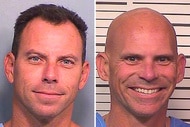Create a free profile to get unlimited access to exclusive videos, breaking news, sweepstakes, and more!
Man Wrongfully Imprisoned For 17 Years In 'Doppelganger' Case Wins $1M Settlement
Richard Jones spent nearly 20 years in prison for a crime he was ultimately exonerated of.

A Kansas City man will be compensated more than $1 million after being wrongfully imprisoned for nearly two decades in what has become known as the "doppleganger case."
Richard Jones, 42, was convicted on aggravated robbery charges and sent to prison in 1999, the Kansas City Star reports. Behind bars, it came to Jones’ attention that he and another man, Ricky Amos, bore a striking resemblance to one another — thus paving the way for his eventual exoneration.
After spending 17 years in prison, Jones and his lawyers successfully argued that he was doing time for a crime he didn’t commit. After showing the victim pictures of both Jones and Amos - who has a long rap sheet and lives closer to the scene of the crime, according to the Star - she could no longer definitively say who robbed her.
A judge ordered Jones’ release from prison last year as a result. Now, after Jones filed a lawsuit, the state of Kansas has agreed to compensation Jones to the tune of $1,103,945.16, the state attorney general’s office announced in a news release on Tuesday. The court also ruled that Jones be granted a certificate of innocence, counseling, and state health care benefits for two years, in addition to the expungement of court records detailing his conviction and arrest and the disposal of any biological samples obtained from Jones in relation to the case, according to the attorney general’s office.
The decision was made in accordance with the state’s mistaken-conviction statute, the office said.
“We are committed to faithfully administering the new mistaken-conviction statute the legislature enacted,” Attorney General Derek Schmidt said, according to the release. “In this case, it was possible on the existing record to resolve all issues quickly, satisfy all of the statute’s requirements, and agree to this outcome so Mr. Jones can receive the benefits to which he is entitled by law because he was mistakenly convicted.”
Jones’ suit was the first to be filed under the statute, according to the attorney general’s office. The settlement must be reviewed and approved by the state’s finance council, after which time Jones will begin receiving payment, they said.
Jones was accused of robbing a woman in a Walmart parking lot and making off with her cellphone on Memorial Day in 1999, according to the Star, and his conviction was based heavily on eyewitness testimony, which placed him at the scene of the crime.
Despite having an alibi, a jury found Jones guilty of armed robbery.
Years later, when other inmates began mistaking Jones with another man, he started to put two and two together, the Star reports.
Jones teamed up with the Midwest Innocence Project and the University of Kansas School of Law, and attorneys tracked down information on his rumored lookalike, a man they discovered lived in the same area as the Walmart where the robbery occurred. When the attorneys showed photos of the two men to Tamara Scherer, the victim of the crime, as well as other witnesses, they were not confident in their ability to tell the two men apart, according to the outlet.
Attorneys presented this new evidence before a judge during a June 2017 hearing, at which point the judge did not proclaim Jones innocent, but did rule that a jury would not have found him guilty in light of the new evidence, the Star reports. The judge overturned his conviction and prosecutors did not file new charges, making Jones a free man. His lookalike, Ricky Amos, has denied any involvement with the crime and has not been charged, NBC News reports. He is currently in jail in Sedgwick County, Kansas on unrelated charges, according to online records.
Jones’ conviction reignited debate on the reliability of eyewitness testimony. In the photo lineup that police showed to witnesses in his case, Jones was the only light-skinned black male suspect, making him the “victim of an unnecessarily suggestive police lineup,” his attorneys previously argued in court documents.
[Photo: Ricky Amos (l.) and Richard Jones (r.), Kansas Department of Corrections]






















